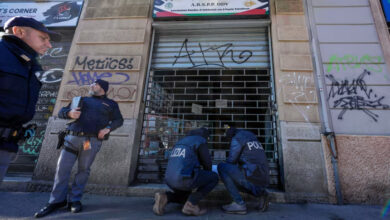
Egyptian authorities have given Italian investigators some evidence they had been seeking for weeks regarding the murder of an Italian graduate student in Cairo, the Foreign Ministry said on Wednesday.
The move came just hours after an Italian judicial source told Reuters that Italy was considering recalling its seven-member legal team in Cairo because of a lack of cooperation from their Egyptian counterparts.
Giulio Regeni, 28, disappeared in January and his tortured, battered body was found in a ditch on the outskirts of Cairo on February 3. He had been studying Egypt's independent labour unions and wrote critical articles about the government.
The case has stirred outrage in Italy and strained relations between two countries that share major geopolitical and economic interests, with widespread speculation in the media that Regeni was killed by either police or security services.
Egypt has denied any such suggestion.
The Egyptian authorities invited Italian police to join the murder inquiry, but the Italians have complained from the start that they were not being given the information they needed.
On Wednesday investigators received some, though not all, of the evidence they had requested, including data about Regeni's cell phone calls, a partial summary of the Egyptian autopsy and information gathered by police from witnesses.
"It's a first, useful step," the Foreign Ministry said in a statement. "Some of the material requested by our embassy has not yet been handed over."
On Wednesday, Milan officials hung a banner from city hall reading "The Truth for Giulio Regeni", in response to a campaign by human rights group Amnesty International. Other cities around the country started to follow suit.
An Egyptian forensics official has told the public prosecutor's office the autopsy he conducted showed Regeni was interrogated for up to seven days before he was killed, Reuters reported on Tuesday, citing two sources.
The findings, which were denied by Egypt's Justice Ministry, are the strongest indication yet that Regeni was killed by security services because they pointed to interrogation methods which human rights groups say are their hallmark.
The case has caused friction between Egypt and Italy, though it looks unlikely to drive a permanent wedge between them.
Italy exported some 3 billion euros (US$3.25 billion) in goods to Egypt last year, Italian export credit agency Sace said.
State-controlled oil producer Eni is leading the way for Italian firms, developing Egypt's giant Zohr gas field.
In a letter to Amnesty International seen by Reuters, Eni CEO Claudio Descalzi expressed his support for Regeni's family.
"We are confident in the work being done by the Egyptian and Italian governments and we can't but hope, like everyone, that the question marks regarding this affair are cleared up as soon as possible," Descalzi wrote last month. ($1 = 0.9226 euros)




